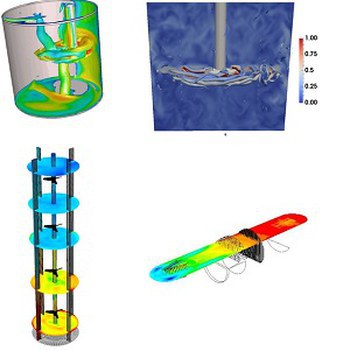The research activity of the chemical engineering group, PRocess Intensification in Multiphase Equipment (PRIME), is focused on the development of innovative equipment and on the optimization of traditional equipment for process intensification in the chemical, biochemical and formulation industries in general (for example, food, Fast Moving Consumer Goods (FMCG), pharmaceuticals, ...). The activity is divided into a line of experimental research and another one of modeling. The experimental research is conducted with the use of non-intrusive techniques, mainly optical diagnostics, tomographic and other sensor technologies (Passive Acoustic Emission), while the modeling activity is developed in the field of Computational Fluid Dynamics (CFD).
Examples of studies carried out with the mentioned methodologies concern: mechanically agitated reactors, static mixers, fluidized bed columns, membrane modules for the purification of gaseous streams, inertial separators for Oil & Gas applications, model anaerobic digesters, model bioreactors for the production of bio-H2, model aerobic fermenters, drug inhalers, dialysis modules, filter presses.
The fluid dynamic investigations of the equipment are carried out through measurement based on the "Particle Image Velocimetry" (PIV) technique, which can be applied to the study of multiphase and turbulent systems, in planar and stereoscopic configuration. Through the "Planar Laser Induced Fluorescence" (PLIF) technique, the dynamic performance of the apparatuses, the characteristic times of mixing and the phenomena of mass transfer are also studied. The experimental investigation of dense and opaque multiphase systems is carried out using the Electrical Resistance Tomography (ERT) technique, which allows, among other things, to evaluate the concentration distribution of the phases within the equipment. The characterization of the size distribution of drops and solid particles, of micron and submicron size, is carried out by Malvern Spraytech.
Passive Acoustic sensor-based technology can be used for monitoring and characterizing equipment operating with multiphase mixtures, e.g. for the identification of multiphase regimes. This technique allows to provide information even in transient operations, that is, at very low time scales. Recently this technology has been commercialized to obtain the rheological characterization (In-line) of a process fluid.
The research group also has expertise in rheological characterization of fluids and is interested in the evaluation of mixing dynamics for non-Newtonian fluids, both through batch (stirred tanks) and continuous (static mixers) methodologies.
The modeling activity is performed with finite volumes CFD codes both closed (Ansys Fluent) and open source (OpenFOAM). Its goal is the development of fully predictive computational approaches and computational models and methods are rigorously tested against experimental data. The final objective is to contribute to the development of advanced modeling methods for the realization of innovative equipment, the transition of scale and the optimization of equipment for new processes.
More recently, the research activity is moving towards the use of experimental results, obtained with the various diagnostic techniques already mentioned and also through sensing fusion techniques (more than one measurement at the same time) and computational approaches, to develop reduced models for process optimization or develop algorithms for process control based on Artificial Intelligence (AI) techniques.
On specific research topics, collaborations are activated with colleagues from various national and international institutions, as can be seen from the collaborative articles published over the years.
The PRIME Group has a consolidated experience in the field of applied research, so it has developed over the years experiences of collaboration with various industrial realities, ranging from multinational companies to start-ups.
ERC Sectors
PE8_2 Chemical engineering, technical chemistry
PE8_4 Computational engineering
PE8_5 Fluid mechanics, hydraulic-, turbo-, and piston engines
PE8_12 Sustainable design (for recycling, for environment, eco-design)
Scientific Director
Giuseppina Montante
Development of advanced modeling techniques for innovative equipment and processes with CFD methods.
Group members
Francesco Maluta
Development of multi-scale approaches for the numerical simulation of equipment and processes in the field of closed and open source computing codes
Federico Alberini
Development of experimental techniques (PIV, ERT, passive acoustic, optical techniques), Machine Learning techniques, sensors for process monitoring
Alessandro Paglianti
Development of experimental techniques (PIV, ERT, optical techniques) and innovative equipment for process intensification
National and international collaborations
INSA Toulouse, Toulouse, France – Toulouse Biotechnology Institute - Dr Jerome Morchain.
The University of Manchester, Manchester, UK - School of Chemical Engineering & Analytical Science- Dr Claudio Pereira da Fonte.
The University of Birmingham, Birmingham, UK - School of Chemical Engineering, Prof. M.J. Simmons, Prof. A. Alexiadis, Prof. A.W. Nienow.
University College London, London, UK- Department of Biochemical Engineering- Prof. Martina Micheletti.
University College London, London, UK- Department of mechanical Engineering Prof. A. Ducci
University of Chemistry and Technology, Prague, Czech Republic - Chemical Engineering - Dr. Ing. Tomáš Moucha.
Chongqing University, China - College of Chemistry & Chemical Engineering- Prof. Zuohua Liu
University of Saskatchewan, Saskatoon, Canada - College of Engineering – Prof. Suzanne Kresta
University of Alberta, Edmonton, Canada - Faculty of Engineering – Prof. Alexandra Komrakova
The University of Liverpool, Liverpool, UK - School of Engineering - Dr Davide Dapelo.
Karlsruhe Institute of Technology, Karlsruhe ,Germany, Institute for Mechanical Process Engineering and Mechanics - PD.Dr Matthias Krause
